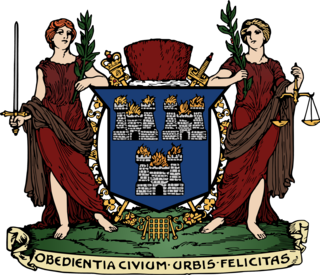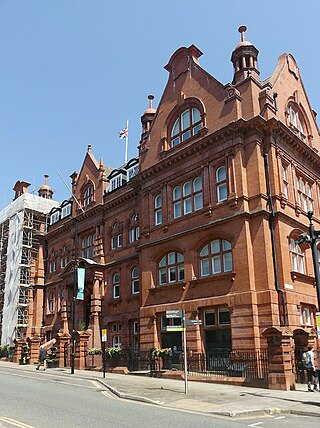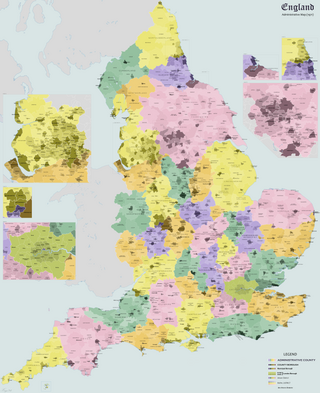Related Research Articles

Metropolitan counties are a subdivision of England which were originally used for local government. There are six metropolitan counties: Greater Manchester, Merseyside, South Yorkshire, Tyne and Wear, West Midlands and West Yorkshire.
Local government in Wales is primarily undertaken by the twenty-two principal councils. The councils are unitary authorities, meaning they are responsible for providing local government services within their principal area, including education, social work, environmental protection, and most highway maintenance. The principal areas are divided into communities, most of which have an elected community council. The services provided by community councils vary, but they will typically maintain public spaces and facilities. Local councils in Wales are elected; the most recent local elections in Wales took place in 2022, and the next are due to take place in 2027.

Eastwood is a former coal mining town and civil parish in the Broxtowe district of Nottinghamshire, England, 8 miles (13 km) northwest of Nottingham. Mentioned in Domesday Book, it expanded rapidly during the Industrial Revolution. The Midland Railway was formed here and it is the birthplace of D. H. Lawrence.

Dublin City Council is the local authority of the city of Dublin in Ireland. As a city council, it is governed by the Local Government Act 2001. Until 2001, the authority was known as Dublin Corporation. The council is responsible for public housing and community, roads and transportation, urban planning and development, amenity and culture and environment. The council has 63 elected members and is the largest local council in Ireland. Elections are held every five years and are by single transferable vote. The head of the council has the honorific title of Lord Mayor. The city administration is headed by a chief executive, Richard Shakespeare. The council meets at City Hall, Dublin.

The Metropolitan Borough of Wigan is a metropolitan borough of Greater Manchester, England. It is named after its largest town, Wigan but covers a far larger area which includes the towns of Atherton, Ashton-in-Makerfield, Golborne, Hindley, Ince-in-Makerfield, Leigh and Tyldesley. The borough also covers the villages and suburbs of Abram, Aspull, Astley, Bryn, Hindley Green, Lowton, Mosley Common, Orrell, Pemberton, Shevington, Standish, Winstanley and Worsley Mesnes. The borough is also the second-most populous district in Greater Manchester.

The Metropolitan Borough of Oldham is a metropolitan borough of Greater Manchester in England. It is named after its largest town, Oldham. The borough had a population of 243,912 in 2022, making it the sixth-largest district by population in Greater Manchester. The borough spans 142 square kilometres (55 sq mi).

In England, a civil parish is a type of administrative parish used for local government. It is a territorial designation which is the lowest tier of local government. Civil parishes can trace their origin to the ancient system of parishes, which for centuries were the principal unit of secular and religious administration in most of England and Wales. Civil and religious parishes were formally split into two types in the 19th century and are now entirely separate. Civil parishes in their modern form came into being through the Local Government Act 1894, which established elected parish councils to take on the secular functions of the parish vestry.

A municipal borough was a type of local government district which existed in England and Wales between 1836 and 1974, in Northern Ireland from 1840 to 1973 and in the Republic of Ireland from 1840 to 2002. Broadly similar structures existed in Scotland from 1833 to 1975 with the reform of royal burghs and creation of police burghs.

The Local Government Act 1972 is an act of the Parliament of the United Kingdom that reformed local government in England and Wales on 1 April 1974. It was one of the most significant Acts of Parliament to be passed by the Heath Government of 1970–74.

Nottingham City Council is the local authority for the city of Nottingham, in the ceremonial county of Nottinghamshire in the East Midlands region of England. Nottingham has had a council from medieval times, which has been reformed on numerous occasions. Since 1998 the council has been a unitary authority, being a district council which also performs the functions of a county council. Since 2024 the council has been a member of the East Midlands Combined County Authority.

Suffolk County Council is the upper-tier local authority for the county of Suffolk, England. It is run by 75 elected county councillors representing 63 divisions. It is a member of the East of England Local Government Association.
The wards and electoral divisions in the United Kingdom are electoral districts at sub-national level, represented by one or more councillors. The ward is the primary unit of English electoral geography for civil parishes and borough and district councils, the electoral ward is the unit used by Welsh principal councils, while the electoral division is the unit used by English county councils and some unitary authorities. Each ward/division has an average electorate of about 5,500 people, but ward population counts can vary substantially. As of 2021 there are 8,694 electoral wards/divisions in the UK. An average area of wards or electoral divisions in the United Kingdom is 28.109 km2 (10.853 sq mi).

The Isle of Anglesey County Council is the local authority for the Isle of Anglesey, a principal area with county status in Wales. Since 2022 the council has 35 councillors who represent 11 multi-member electoral wards.
Sir Michael Thomas Lyons is a British politician and former Chairman of the BBC Trust. He currently serves as non-executive chairman of the English Cities Fund and chairs the board of the SQW Group.

Nottinghamshire County Council is the upper-tier local authority for the non-metropolitan county of Nottinghamshire in England. It consists of 66 county councillors, elected from 56 electoral divisions every four years. The most recent election was held in 2021.
The Lyons Inquiry was an independent inquiry into the form, function and funding of local government in England. Appointed jointly by the Chancellor of the Exchequer and the Deputy Prime Minister in the summer of 2004, Sir Michael Lyons produced several reports over the next 3 years, culminating in a final report on the future of local government published alongside the Chancellor's Budget in March 2007.

A combined authority (CA) is a type of local government institution introduced in England outside Greater London by the Local Democracy, Economic Development and Construction Act 2009. CAs are created voluntarily and allow a group of local authorities to pool appropriate responsibility and receive certain devolved functions from central government in order to deliver transport and economic policy more effectively over a wider area. In areas where local government is two-tier, both must participate in the combined authority.

Woking Borough Council is the local authority for Woking in Surrey, England. The council consists of 30 councillors, three for each of the 10 wards in the town. It is currently controlled by the Liberal Democrats, led by Ann-Marie Barker. The borough council is based at Woking Civic Offices.
Richard Watts, is a Labour Party politician. He is currently Deputy Chief of Staff to the Mayor of London, Sadiq Khan.
The 1973 Nottinghamshire County Council election was held on Thursday, 12 April 1973. The election resulted in the Labour Party winning an overall majority of seats on the council.
References
- 1 2 James, Saffron; Cox, Ed (2007). "Ward councillors and community leadership A future perspective" (PDF). youngfoundation.org. Young Foundation.
- ↑ Strong and prosperous communities: the local government white paper (PDF). London: The Stationery Office. 2006. ISBN 9780101693929.
- ↑ Lyons inquiry into local government : place-shaping : a shared ambition for the future of local government (PDF). London: Stationery Office. 2007. ISBN 978-0-11-989854-5.
- ↑ "Councillors' divisional fund". Nottinghamshire County Council. Nottinghamshire County Council. Retrieved 4 March 2022.
- 1 2 Mallet, Keith (2013). Briefing Note – Ward Budgets (PDF). Dorset Council. Retrieved 4 March 2022.